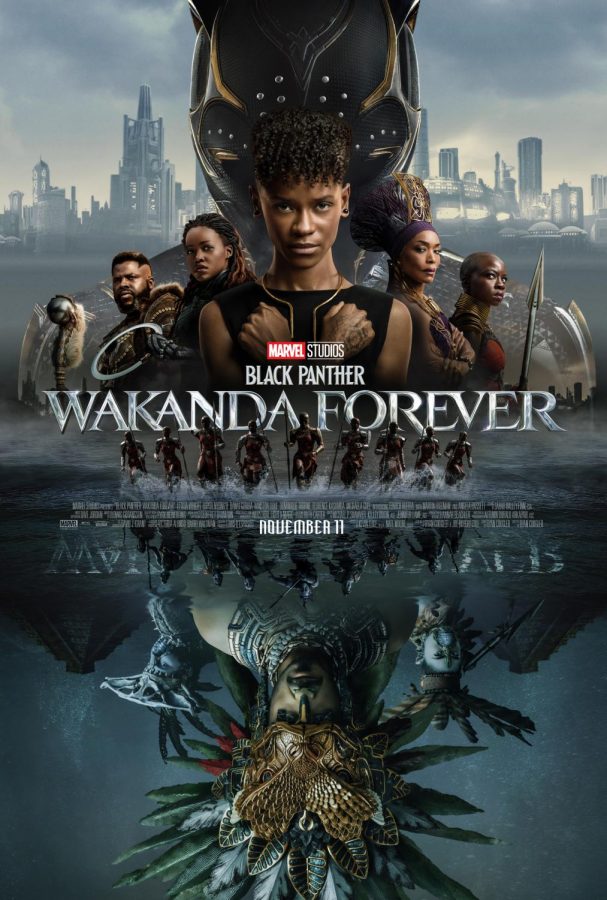A Legendary Superhero is Back but not as Expected
Poster for Black Panther: Wakanda Forever. © 2022 MARVEL.
January 6, 2023
One of the most highly anticipated movies of the year was released on November 11, Black Panther: Wakanda Forever, a sequel to Black Panther.
Tragically, on August 28, 2020, actor Chadwick Boseman, who played Black Panther, died due to colon cancer. This left fans shocked and Marvel was left with the daunting task of creating a movie without the lead actor.
Further than playing an iconic African character, Boseman was a role model for thousands and raised the bar for representation on the screen. Senior Sasha Grant acknowledges the impact Boseman had.
“Seeing a more diverse cast was very uplifting and empowering,” she said.
Beyond having representation, Grant explained that Black Panther: Wakana Forever allowed for a film to be more than just race.
“It’s not always about race, we have an area where we can relax and watch a movie for the enjoyment of superheroes and Marvel and not be about race or what’s going on in the world,” Grant said.
Having to take a different route than originally intended, the director, Ryan Coogler, had to make adjustments to the script and adapt to circumstances. The movie had a considerable amount of pressure from the public to release a good movie and to live up to the expectations after the last Black Panther movie.
For the Marvel Cinematic Universe, all of “Phase Four” has tackled grief and consequences from the climax of the MCU in Avengers: Infinity War and Avengers: Endgame.
Black Panther: Wakanda Forever was never going to be an exception for this theme, but after the death of Chadwick, it was even more fitting.
Junior Kyle Manker said that Chadwick’s death made the movie even more powerful.
“If he was still alive I feel like it would have been more of an action film, but this was more symbolic and went way deeper into issues,” he said.
The movie tackles the emotions of grief, sorrow, and the joy of life. Queen Ramonda stepped up as queen of Wakanda after the death of T’Challa. Shuri, T’Challa’s younger sister, is faced with tackling the emotions of grief after losing her brother. The movie takes on serious topics of death and grief, but the director does a good job of uplifting the movie.
While Wakanda is grieving the rest of the world is greedily searching for vibranium. The United States Navy SEALS and CIA stumbles upon vibranium in the sea by using a vibranium detecting machine accidently made by MIT genius Riri who comes into play later in the movie.
The expedition is abruptly stopped when a group of blue-skinned underwater superhumans led by the main antagonist, Namor, ambushes the ship and kills everyone on board. With no leads and all witnesses dead, the United States came back with only a seemingly plausible explanation: Wakanda was to blame for the attack.
Since the only person in the world who can make a vibranium detecting machine is Riri, driven by their greed, the United States set out to search for Riri. Anticipating their search for, Shuri and Okoye successfully find Riri first, and take her back to Wakanda.
The FBI find the Wakandans and pursue them, but are abruptly attacked by Namor. Namor captures Shuri and takes her to their vibranium-rich underwater world called Talokan.
Namor is angered at the surface world for enslaving his people, and in revenge, is wanting to create an army. Namor delivers an ultimatum to Shuri stating that Wakanda can either join them in their fight or be destroyed if they refuse.
Nakia, T’Challa’s love interest, is sent to the underworld to rescue Shuri, and in the process, kills a person from Talokan. The news devastates Namor and brings an army to attack Wakanda. In the attack, Queen Ramonda drowns, devastating viewers.
Wakanda is left vulnerable with no leader and no black panther. M’Baku steps up and assumes king of Wakanda, and he encourages Shuri to face this grief and loss. Circumstances and advice force Shuri to face the death of her brother and mother.
Using the remnant of a herb, Shuri recreates the heart-shaped herb and ingests it, making a monumental scene in the movie of Shuri becoming the Black Panther.
Without the time to properly heal from the loss of her mother, Shuri goes to exact revenge on Namor and his people. Wakandans fight Namor and his warriors.
Taking a different route than seen before, Marvel acknowledges that not all stories are black and white. This fight scene ends in Namor and Shuri making a peaceful alliance. Riri also makes an appearance in the battle in a very IronMan like suit.
The movie ends with arguably the best part of the movie when Shuri goes to visit Nakia, T’Challa’s love interest. Shuri finds out that Nakia and T’Challa had a son Nakia had been raising in secret and his name was T’Challa. This scene pierced the audience’s hearts and was the heartwarming ending the movie needed.
Though the movie did honor and celebrate the life lived by Chadwick Boseman and the impact of losing Black Panther, they didn’t solely focus on his death, instead, dealing with loss and fighting through hard feelings of grief.
Grant describes her emotions while watching as “happy, sad and seeing the process of grief and seeing them having to move on, portrays in real life too that we have to grieve over someone but you have to move on too.”
Wakanda Forever is a rollercoaster of emotions, while it is exciting to welcome in new women leads to superhero characters with Riri and Shuri, one can’t help but to leave the theater without shedding a few tears over the ones lost in the process.
Black Panther: Wakanda Forever will likely stay in theaters until mid January 2023, and is set to release on Disney+ on February 1.


